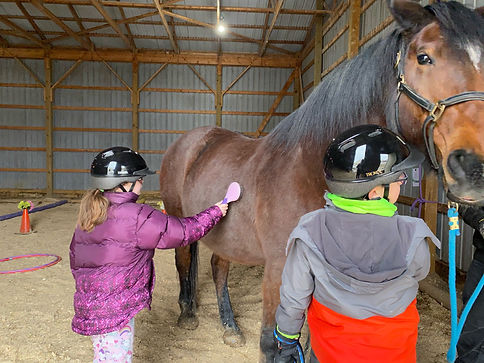
ACADEMIC SKILLS DEVELOPMENT



Academic Skills Development with Horses
Our unique academic skills development program, Horse Powered Reading & Math integrates social-emotional learning with academics. Students see and experience reading with their entire mind, body, and emotions by creating parallels to real life for the skills involved in reading and math. Often social-emotional issues, ADHD, anxiety, depression, and other mental health concerns can get in the way of students learning. Our program can break through those challenges, giving students a chance to learn or reinforce reading and math skills. In each lesson, issues affecting learning are made visible by identifying obstacles (through the use of toys and props) that get in the way of understanding. As experiential learning focuses on the learning process of the individual, the program allows students to make discoveries and experiment with knowledge first hand. Issues that may be getting in the way of academic and social-emotional growth are addressed by the facilitator in the moment. This allows students a chance to reflect on what they are experiencing and provides an opportunity to create new patters of learning in a supported environment. All lessons are tailored to individual needs. The content of each lesson varies depending on the skills being addressed. Our program helps students to externalize their reading and math difficulties to explore and practice new skills or solutions in an emotionally safe environment.

The Development of Horse Powered Reading & Math
Horse Powered Reading & Math (HPR) was created by Michele Pickel Ph.D., Professor of Education at Concordia University, St. Paul, a licensed PK-6 teacher, and a Certified Equine Specialist, in 2012. Dr. Pickel has spent many years using and developing this active experiential leaning unique teaching technique. The learning activities are based on research and the practice of HPR by herself and 160 other people who are trained facilitators in this technique. She has conducted original research into the efficacy and HPR has been engaged in different research projects. Valuable feedback and recommendations came from faculty and therapists of the Wyoming School District where HPR activities were first formalized and a strong latency effect was discovered through family focus groups conducted five months after the project. In Alberta, an elementary school used HPR in their curriculum from 2016-2018. During this time, students grades 2-5, with a wide range of ability levels and needs, benefited from HPR. The research has discovered that it only takes a few reading skills, combined with motivation, self-efficacy/confidence, and persistence, all of which are taught by the horse, to create an exponential growth in learning. In short, it works! HPR appears to continue enhancing reading skills over time as students improved social-emotional skills interact with academics. Children and adults around the world, are gaining motivation, confidence, and persistence, as they learn or review critical reading skills experientially.
Horse Powered Math (HPM) was developed by a fellow HPR facilitator, with the help of Dr. Pickel, and is simply geared towards math skills instead of reading skills. Using the same core values and principles as HPR, HPM helps students to work out a problem hands-on in a safe learning environment.






How Do Horses Help Teach Academic Skills?
How do horses help teach reading? HPR/HPM helps students externalize their reading difficulties in order to explore and practice new skills or solutions in an emotionally safe space. During a lesson, the horse becomes the reading material or “book”, or mathematical material, students need to connect with. Without finding and making some connection with the text or math problem, it is easy to drift away or lose interest in a book or work. The horse becomes a metaphor for that connection. Based on their interactive with the horse, students experience how it feels when a book or text is too hard or too easy. This gives the student a chance to learn to choose a “just right” book. We can even see our horse as a Reading Buddy! Facilitators can then ask open-ended questions to help students discover the importance of connecting and allows for the exploration of better way to do it. Through this process, the horse creates an opportunity for immediate feedback ad experiential learning to take place.
Horses are natural teachers, who are sentient beings and are a lot like us. Horses have distinct personalities and defined social rules within their herd, allowing students to identify and form connections with them. They also have a similar emotional language to our own and can help develop important social-emotional life skills.




